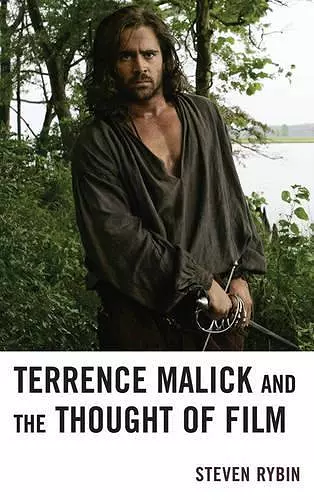Terrence Malick and the Thought of Film
Format:Hardback
Publisher:Bloomsbury Publishing PLC
Published:17th Nov '11
Currently unavailable, and unfortunately no date known when it will be back
This hardback is available in another edition too:
- Paperback£45.00(9780739180105)

As the director of Badlands, Days of Heaven, The Thin Red Line, and The New World, Terrence Malick has created a remarkable body of work that enables imaginative acts of philosophical interpretation. Steven Rybin's Terrence Malick and the Thought of Film looks closely at the dialogue between Malick's films and our powers of thinking, showing how his work casts the philosophy of thinkers such as Stanley Cavell, Martin Heidegger, Walter Benjamin, André Bazin, Edgar Morin, and Immanuel Kant in new cinematic light.
With a special focus on how the voices of Malick's characters move us to thought, Terrence Malick and the Thought of Film offers new readings of his films and places Malick's work in the context of recent debates in the interdisciplinary field of film and philosophy. Rybin also provides a postscript on Malick's recently-released fifth film, The Tree of Life.
A painstaking craftsman, Malick has made only a handful of films in his career, but each bears the mark of a deeply individualistic director who makes only films in which he is really invested. He has completed five feature films in all--he is a meticulous auteur indeed--and this makes him an ideal subject for this detailed, compact book, as each film can have a chapter all to itself. Rybin (Georgia Gwinnett College) offers persuasive readings of Badlands (1973), which is based on the Charles Starkweather murder spree in Nebraska; the romantic period drama Days of Heaven (1978); the epic WW II narrative The Thin Red Line (1998); the underrated The New World (2005), which looks at the founding of the American colony at Jamestown, Virginia; and The Tree of Life (2011), a family drama set in 1950s Texas, which takes on cosmic overtones as the film progresses. This is a concise, measured, intelligent study of Malick's work, ideal for a course on his films or as an introduction for the general reader. Summing Up: Highly recommended. Lower- and upper-division undergraduates; graduate students; professionals; general readers. * Choice Reviews *
Deftly combining theoretical reflection with detailed film analyses, Rybin opens up Malick’s unique cinematic worlds—from Badlands to The Tree of Life—with skill and subtlety, bringing fresh philosophical insight and fine critical understanding to our appreciation of his cinematic achievements. -- Robert Sinnerbrink, Macquarie University
Steven Rybin has written a superbly rich and much needed study of character in the films of Terrence Malick. Taking his cue from the burgeoning field of film-philosophy, Rybin is unhampered by any one philosophical dogma and instead lucidly argues that Malick’s films and characters should be viewed as 'companions to thought' through a wide range of philosophical lenses. This book is essential reading for any serious thinker interested in the films of Terrence Malick. -- Thomas Deane Tucker, Chadron State College
This book is by far the most comprehensive, thorough, and readable monograph on Terrence Malick’s five films. His approach is varied and inclusive, defining and adopting different strategies to engage distinct problems in film criticism and in Malick’s cinema. Rybin is as attentive to the details and nuances of Malick’s films as he is to the observations and arguments of Malick’s other critics and commentators. -- Stuart Kendall
Examines the slender but critically acclaimed oeuvre of director Malick (born 1943) in five chapters, each examining the intersection of film and philosophy for a single film: Badlands, Days of Heaven, The Thin Red Line, The New World, and The Tree of Life. * Communication Booknotes Quarterly *
ISBN: 9780739166758
Dimensions: 241mm x 161mm x 21mm
Weight: 526g
236 pages